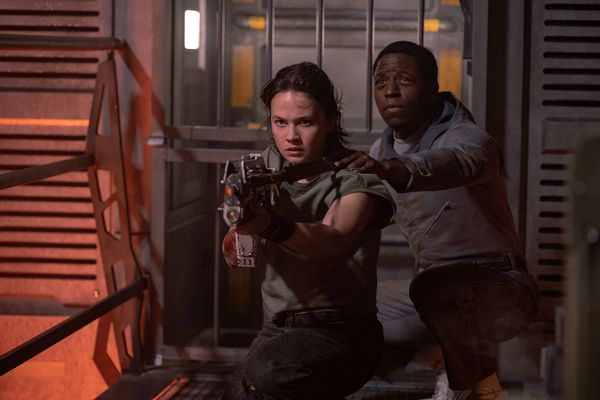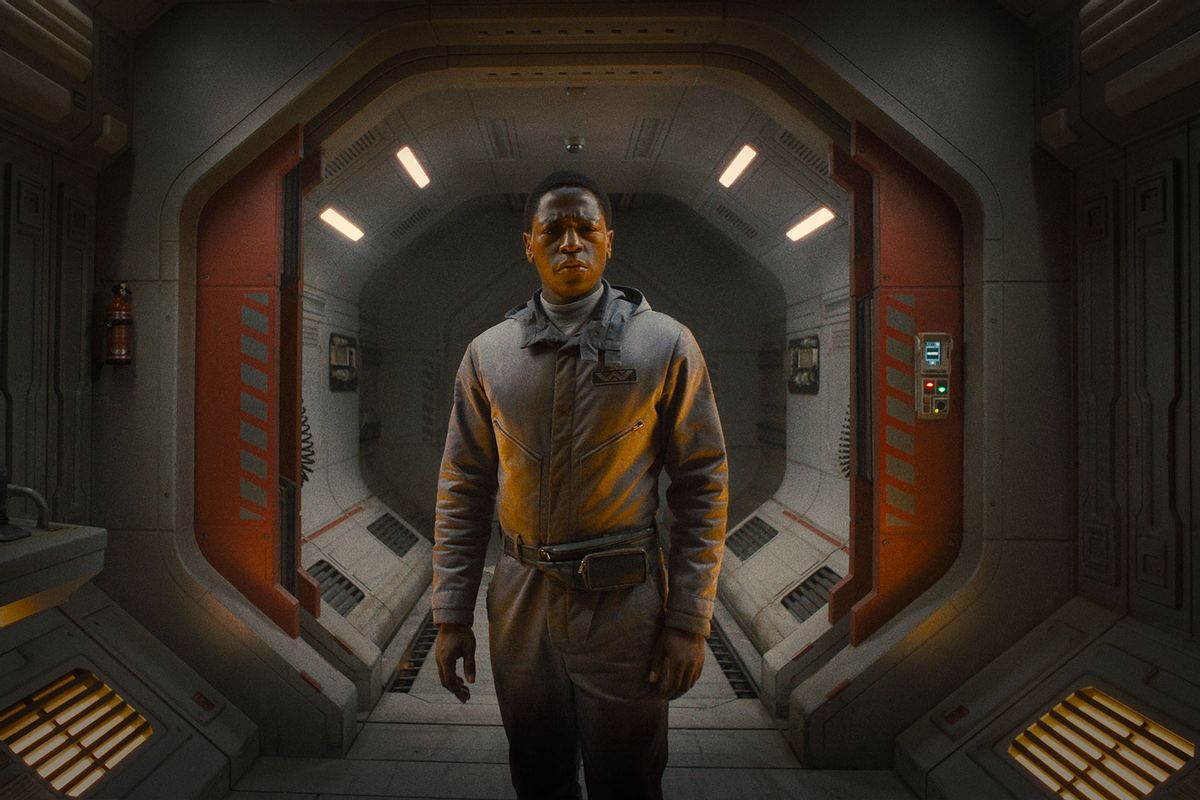A strong opening weekend box office take for “Alien: Romulus” proves how eager we are to see Ridley Scott’s franchise return to its roots. As for its indelibility, that’s up for debate. “Romulus” could relaunch the saga for the next generation or it might be a passing enthusiasm.
But that classic “one thing we can all agree on,” as it were, is David Jonsson’s outstanding rendition of Andy, the outdated android programmed to protect Rain Carradine (Cailee Spaeny), our gutsy protagonist.
Andy joins the longer history of a franchise wherein the androids are often at odds with Isaac Asimov’s classic Three Laws of Robotics.
Rain considers Andy to be her brother. Without him, she would be entirely alone in a mining colony whose management is fine with working the population to death. Without Andy, a so-called “synthetic person,” we get the sense that Rain wouldn’t experience much humane treatment at all.
Mainly that is because Andy gives Rain someone or something to care for. Andy looks like a human adult but behaves like an awkward, stammering middle-schooler eager to ingratiate himself with his peers by telling toothless jokes straight out of a Scholastic pun manual.
Once Andy boards a derelict space station and interfaces with its programming, the rules change. Suddenly he is functionally better equipped to survive than the humans who brought him along. Now they’re a drag on him, not the other way around. Rain’s well-being is barely an afterthought.
Andy joins the longer history of a franchise wherein the androids are often at odds with Isaac Asimov’s classic Three Laws of Robotics, the foremost being robots “may not injure a human being or, through inaction, allow a human being to come to harm.”
Since Ellen Ripley survived her first xenomorph encounter way back in 1979, Scott has used this to critique our reliance on technology and our assumed dominance over it through his androids. His prequels “Prometheus” and “Alien: Covenant” introduce Michael Fassbender’s David 8 as ur-synthetic in this corporate-controlled universe, a robot that self-actualizes to develop such a disdain for humans that he propagates the galaxy with the ultimate destroyer.
On the other end of the scale are Lance Henriksen’s Bishop and Winona Ryder’s Call — robots so human and empathetic that they make most of the flesh-and-blood people around them look unprincipled.
Jonsson’s Andy fluctuates along that spectrum, stopping short of David’s contempt and sadism in his upgraded self, but never approaching Bishop’s level of humanity. He’s smarter, stronger, colder and emotionless in his calculations.
Andy will not, for instance, hold the way open for his human allies fleeing a horde of scuttling terrors. The best he’ll do is trust they know he’s computed their running speed against the rate of the closing doors to ensure the humans make it in the nick of time. He’s less outrightly murderous than Darwinian.
Fede Álvarez and Rodo Sayagues’ script implies that Rain is better off with a slightly broken version of Andy, one that prioritizes Rain’s safety but lacks the brains or will to ensure it until his circuited hand is forced.
This makes Jonsson’s entry within another “Alien” legacy more fraught, in that this is a filmic universe that features Black men (played by a roster of impressive actors that includes Yaphet Kotto, Charles S. Dutton, Gary Dourdan, Ricco Ross, Al Matthews and Idris Elba) in support roles to white women. That includes one whose knack for surviving one of the galaxy’s most lethal species makes her a symbol of feminist ferocity and a pop culture icon.
Here’s where I remind you of the spoiler alert at the top of this article, since reading into what Jonsson’s character brushes against (if not entirely represents) means revealing his fate.
To know the “Alien” mythos is to know what happens to most of those whose paths cross with that of Sigourney Weaver’s Ellen Ripley: the survival rate is generally very low. Kotto’s Parker died terribly, but so did everyone else on the Nostromo except for Ripley and the starship’s cat Jonesy.
There is no way to consider any movie sequel to be completely divorced from previous chapters’ racial optics.
The same is true for all the others portrayed by other Black actors in the series, although in the third movie Dutton’s Dillon offered himself up as bait to make sure the xenomorph died shrieking. “Alien 3” came out in 1992, part of a decade that yielded the cinematic trope of “the sacrificial negro.”
At least Andy survives. He’s also the best-written character in “Alien: Romulus” in terms of his psychology and emotionality. Rare are the characters who emerge on the other side of a story in which they betray a vulnerable figure – for entirely logical reasons, mind you – and still be loved by the audience.
Nevertheless, his personality arc is somewhat constructed on problematic architecture.
At the beginning of “Romulus,” Andy’s gentle grin and occasional glitches explain Rain’s protectiveness toward him. His pliant nature makes him a bullying magnet, including by Rain’s friends. Even the kinder ones who persuade her and Andy to join them on a scavenging run to what looks like an abandoned space station treat him as expendable. That’s what he was built to be.
Andy is a recognizable type within the white savior realm: a Black man with extraordinary potential who can only flourish under the shelter and care of a white person who takes him in as “family.”
This remains the case when Andy encounters the slimy remains of Rook, the derelict vessel’s android science officer who looks exactly like Ash, the series’ first android traitor introduced in 1979’s “Alien.” Thanks to the late Ian Holm’s face being digitally superimposed over that of Daniel Betts, we’re primed to recognize that Ash is up to no good.
Sure enough, his chicanery begins with him lording his digital seniority over Andy, reminding him while overwriting his programming that while Ash is the most state-of-the-art synthetic, Andy is an obsolete model made for physical labor. Ahem.
In this exchange and others, though, there may be an unspoken commentary rustling beneath what’s said and seen, hinting that Álvarez and Sayagues may be aware of what they're conveying through Jonsson’s character.
 Cailee Spaeny as Rain Carradine and David Jonsson as Andy in "Alien: Romulus" (Photo courtesy of 20th Century Studios/Murray Close)
Cailee Spaeny as Rain Carradine and David Jonsson as Andy in "Alien: Romulus" (Photo courtesy of 20th Century Studios/Murray Close)
When Andy’s told he can’t accompany his human teammates, including Rain, to the promised land they’re seeking, he seems momentarily confused, hurt possibly, until he lands on the obvious. If that’s what’s best for her, then he’s OK with being cast on the scrap heap.
Andy 2.0 is not so forgiving. Before he abandons his original directive entirely, an effect of it being overwritten by other programming, he warns Rain that she won’t see him like a child anymore. Not long after that, he begins acting without sentimentality, making decisions on who or what has the best chances.
It’s a safe bet that some of you are reading this and wondering what Andy’s or Jonsson’s melanated complexion has to do with any of this. Fair enough. Jonsson probably took on this role for the same reason any actor would accept a role in one of the most resilient film series in cinema, let alone one that offers the challenging versatility written into Andy.
However, there is no way to consider any movie sequel to be completely divorced from previous chapters’ racial optics. Especially with “Alien,” a franchise where a decision to cast a woman in a role originally written for a man made it iconic.
Imagine how different “Aliens” would have been if Ross, who played Pvt. Frost but originally read for the part of Corporal Hicks, had gotten that role instead of Michael Biehn, one of Weaver’s main co-stars. It may not have altered the parental dynamic that Hicks and Ripley shared but it may have changed other assumptions we projected on those two characters. Remember, this movie came out in the mid-1980s when interracial relationships between Black men and white women weren’t usually foregrounded in action blockbusters.
Andy’s survival contradicts a genre habit of deeming Black characters to be expendable which appears to be intentional on the part of Álvarez and Sayagues. If it is accidental, it’s still commendable that the android’s personality fluctuations look like a conversation with that cinematic cliché.
The credit for pulling that off is as much due to Jonsson’s presence as it is to the script. His thoughtful and riveting performance ensures that we never stop pulling for Andy, even after he dooms the crew’s most vulnerable but least interesting member.
Where the bottom falls out is the last-minute decision for Rain to pull a Jonesy, just like Ripley, and go back for Andy after he’s incapacitated and reverted to his childlike personality.
This is in keeping with the “Alien” yen for leaving no cat or Newt behind.
And, the whole "return to hell's maw" move has been pulled enough before to justify Rain choosing the survival of her organic self over her synthetic support buddy, if only to do something – anything – differently from past films.
This also would have robbed Rain and Spaeny of the chance to channel the heroine the audience knows that she’ll never meet, yanking on our nostalgic heartstrings.
The only way to have come out on top here would have been to design an original endgame. Álvarez and Sayagues didn’t do that, choosing the safer path of homage. Instead of playing out the sacrificial stereotype, the writers revert to the savior archetype.
Jonsson has endeared Andy to the audience enough for future writers to expand his potential to shift course from an old story told too many times.
If “Romulus” represents the start of a new branch for the franchise, perhaps whoever determines its next chapter can draw on the confidence of knowing they don’t have to elevate another Ripley clone. Jonsson’s successful performance proves the audience is ready to see someone like him refuse to die so that the usual suspects can live. Andy is Rain’s best chance for a future. It’s up to her to keep up.



Shares